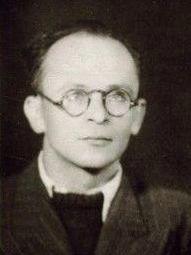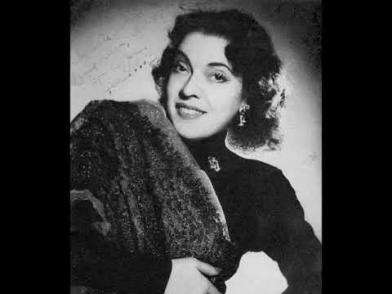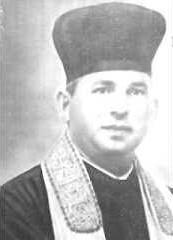Born in Vilna to a poor family and educated at that city’s Talmud Torah, Shmerke Kaczerginski lost both his parents during World War I. As a youth, he was involved with outlawed Communist groups and was arrested several times, serving a lengthy prison term.
At the age of 15 he began publishing original songs and poetry, including Tates, mames, kinderlekh ('Fathers, mothers, children'), and soon began organising Yung Vilne, a secular Jewish writing collective whose other members included Abraham Sutzkever and Chaim Grade. The Nazi invasion of Poland led to Kaczerginski's eventual imprisonment in the Vilna Ghetto, where he helped hide Jewish cultural works with Sutzkever as part of the Paper Brigade and joined the United Partisans Organisation, participating in the failed Vilna Ghetto uprising and then escaping to the forest to fight with both the partisans and the Soviets.
After the expulsion of the Nazis from Vilna by the Soviet Army, Kaczerginski returned home to recover the hidden cultural works and founded the first post-Holocaust Jewish museum in Europe; he quickly became disenchanted with the Soviets and communism and developed into an ardent Zionist. After some time in Łódź, he moved to Paris before eventually relocating to Buenos Aires, where he was killed in a plane crash at the age of 45.
Renowned during his lifetime as a poet and writer, Kaczerginski dedicated much of his time after the start of the Second World War to collecting pre-war Yiddish songs and songs of the Holocaust in order to save Yiddishkeit from destruction. The author, editor or publisher of most of the first post-Holocaust songbooks, Kaczerginski was responsible for preserving over 250 Holocaust songs – the majority of those still known. Despite the enduring popularity of many of his own works, and the importance of his labours to researchers and Yiddish cultural activists, his early death has led to his relative anonymity.
Kaczerginski composed songs during the war, many of which became popular, including Friling ('Springtime'), about his wife's death in the ghetto, and Shtiler, shtiler ('Quiet, Quiet'), his best-known poem (in Hebrew known as Ponar), written in response to the mass murder of Lithuanian Jews in Ponary near Vilna.
Full biographies:
'Shmerke Kaczerginski' in Wikipedia.
Avraham Novershtern, (Translated from Yiddish by Yankl Salant). 'Kaczerginski, Shmerke' in YIVO Institute for Jewish Research website
'Shmerke Kaczerginski' in Music during the Holocaust website.
Other sources:
Werb, Bret Charles, Yiddish Songs of the Shoah: A Source Study Based on the Collections of Shmerke Kaczerginski (PhD thesis at UCLA: 2014).
Songs of Kaczerginski in Zemereshet (in Hebrew)
A list of Shmerke Kaczerginski's publcations at The National Library of Israel website (includings books, songs and scores, ethnographic and commercial recordings)
'Shtiler, Shtiler'/ Partisans Of Vilna: The Songs Of World War II Jewish Resistance:






